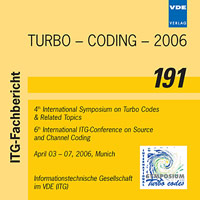A Robust Receive Diversity Scheme for Spatially Correlated Multiple-Antenna Systems Using Second-Order Channel Statistics
Konferenz: TURBO - CODING - 2006 - 4th International Symposium on Turbo Codes & Related Topics; 6th International ITG-Conference on Source and Channel Coding
03.04.2006 - 07.04.2006 in Munich, Germany
Tagungsband: TURBO - CODING - 2006
Seiten: 8Sprache: EnglischTyp: PDF
Persönliche VDE-Mitglieder erhalten auf diesen Artikel 10% Rabatt
Autoren:
Mietzner, Jan; Hoeher, Peter A. (Information and Coding Theory Lab, Faculty of Engineering, University of Kiel, Kaiserstrasse 2, 24143 Kiel, Germany)
Krakowski, Claudiu; Xu, Wen (BenQ Mobile GmbH & Co. OHG, Haidenauplatz 1, 81667 Munich, Germany)
Inhalt:
We consider a simple reduced-complexity receive diversity scheme for spatially correlated multiple-antenna systems, which consists of an inner decorrelation stage based on the Karhunen-Lomueve transform and an outer selection stage. The task of the selection stage is to provide an optimal trade-off between complexity and performance, by selecting an appropriate subset of the eigenvalues/ eigenvectors of the receiver correlation matrix for further processing. The considered receive diversity scheme is solely based on second-order channel statistics. The main focus of the paper is to analyze the complexity-performance trade-off offered by the reduced-dimension receiver and to study the impact of estimation errors concerning the receiver correlation matrix. By means of numerical results, it is shown that the considered receive diversity scheme provides quite a robust performance. We also consider a statistical transmit power allocation scheme, which might be employed in conjunction with the reduced-dimension receiver so as to improve performance.


